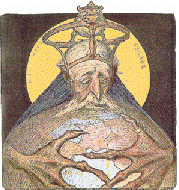May 14: Churches and Anti-Semitism
State of Israel Declared (1948)
Churches and Anti-Semitism
It was on this date, May 14, 1948, that the establishment of the State of Israel was declared in a proclamation delivered at the Tel Aviv Museum. Sadly, a homeland for Holocaust survivors and other Jews did not end anti-Semitism. The oppression of the Jews throughout the ancient world and through the Middle Ages has been well documented. Evidence of anti-Semitism has been found in the writings from Alexandria, Egypt, as early as the 4th century, BCE. In the first century, the Roman Emperor Tiberius deported 4,000 Jews and his successor, Caligula, is credited with the first pogrom.
Early Christian anti-Semitism arose out of doctrinal differences, as the new Christian cult began to believe it had to make the break from its Jewish roots. In 1144, a "blood libel" began in England that Jews murdered Christian children and used their blood in the preparation of their Passover meal. The Bubonic Plague, or Black Death, that wiped out a quarter of Europe's population in the 14th century was quickly blamed on the Jews — who were massacred in Spain, France, Germany and Austria, as a result of accusations that they had caused the death of Christians by poisoning the wells and other water sources.
The Jews fared little better in Muslim countries. In theory, as "People of the Book," they were to enjoy the protection of the true believers; in practice, Jews were segregated, made to wear distinctive clothing, and otherwise treated as second-class citizens. Although there were bright spots, Jews were expelled from Muslim and Christian countries at whim.*
Catholic writers maintain that "the Popes for the most part protected the Jews." However, they cannot point to more than five Popes, out of the 260 preceding World War Two, who did so — and when they did speak up, it was for financial reasons: the church needed money, and only the Jews could lend at interest — charging interest (the original definition of usury) was forbidden by church law (and Muslim sharia law).
Alexander III had a Jew as secretary of the Papal treasury. Innocent III merely protested against popular massacres, yet was the first Pope to make them wear identifying badges. Innocent IV and Martin V were well paid for their protection. Sixtus V merely protected the Jews in order to exploit them better Yes, Protestant reformer Martin Luther initially favored the Jews, but he turned on them when they refused to become Protestants.
Twentieth century Anti-Semitism was driven by envy of perceived economic dominance. The word was coined in Germany in 1873 by Wilhelm Marr as a more respectable way of saying Judenhass or "Jew-hatred." The Nazi innovation was in replacing the religious motive for hating Jews with a racial motive — that Jews, according to Heinrich von Treitschke, are by nature an inferior race, not just unbelievers.
Hitler read the Protocols of the Elders of Zion, a Russian forgery first appearing in 1905, and commented on them in Mein Kampf. It is no surprise then that Vienna became the chief center of world Anti-Semitism. Although the Jews co-operated with the Catholics in opposing Hitler, the Catholics made a separate peace with the Nazis and abandoned the Jews to the tender mercies of Hitler's Reich. It was some consolation to the survivors of the largest pogrom in human history that a Jewish state was formed on this date in 1948.
*Jewish expulsions: from the Frankish kingdom (628); from Mainz (Germany 1012); from France (1182, 1306, 1321-1322, 1394); from England (1290); from Austria (1421); from Warsaw (1483); from Spain (1492); from Sicily (1492-93); from Lithuania (1495); from Portugal (1496-97); from Brandenburg (1510); from Tunisia (1535); from Naples (1531); from Prague (1531); from Genoa (1550, 1567); from Bavaria (1551); from the Papal States (1569, 1593); from Vienna (1670); from Prague (1745); from Germany (1885); from Moscow (1891); Egypt (1956).
Originally published May 2003 by Ronald Bruce Meyer.


